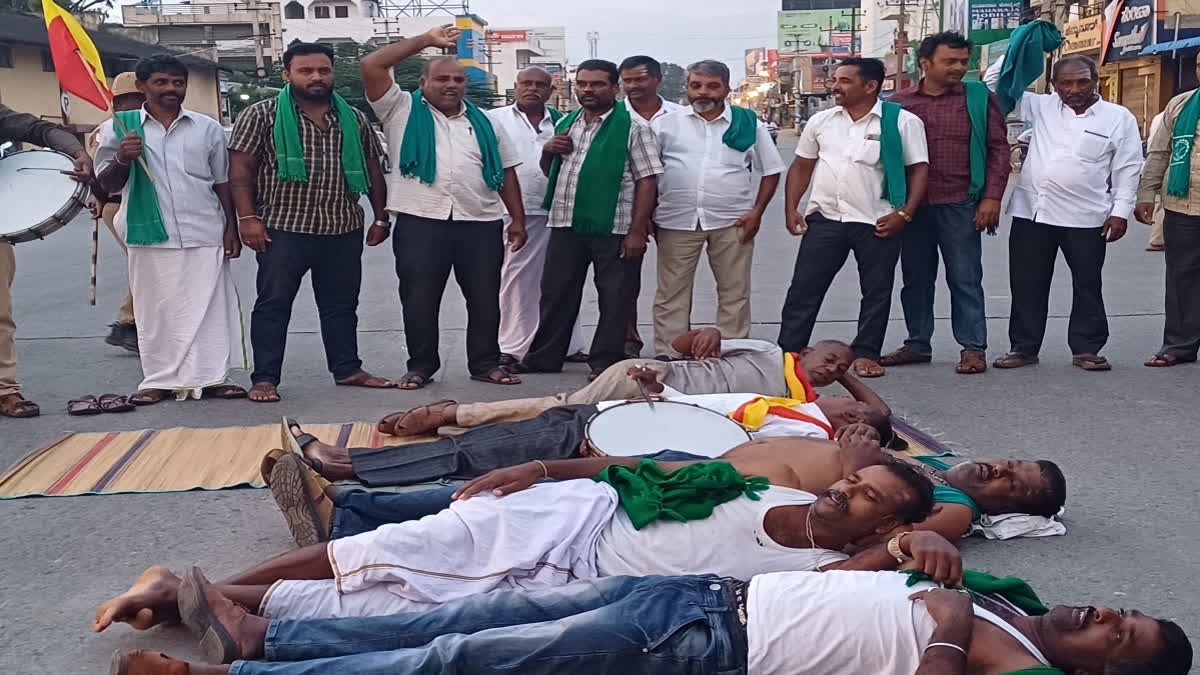Bengaluru (Karnataka): With the closure of schools and colleges and the cancellation of 44 flights, the Karnataka bandh, organized by the 'Kannada Okkoota' to protest against the release of Cauvery river water to Tamil Nadu, brought life in the state to a standstill on Friday. The protest gained significant attention in Bengaluru and across Karnataka, resulting in widespread disruptions.
The umbrella organization 'Kannada Okkoota,' representing Kannada and farmers' groups, has called for a state-wide bandh in Karnataka today to voice their opposition to the release of Cauvery water to Tamil Nadu. In response, authorities have imposed prohibitory orders under Section 144 of the Criminal Procedure Code in Bengaluru Urban, Mandya, Mysuru, Chamarajanagara, Ramanagara, and Hassan districts. Additionally, schools and colleges in these areas have been declared closed for the day.
Bathing in Bottled Water Protest at Freedom Park
As the Karnataka Bandh unfolded, a unique protest took shape at Freedom Park in Bengaluru. Demonstrators, incensed by the water-sharing dispute with Tamil Nadu, began bathing in bottled water. This symbolic gesture aimed to highlight the scarcity of Cauvery river water in the region. Tamil Nadu Chief Minister Stalin's presence only added fuel to the fire, intensifying the protesters' outrage.
Section 144 Imposed; Schools and Colleges Shut Down
To maintain order and security, authorities imposed prohibitory orders under Section 144 of the Criminal Procedure Code in several districts, including Bengaluru Urban, Mandya, Mysuru, Chamarajanagara, Ramanagara, and Hassan. In anticipation of potential unrest, schools and colleges in these areas declared a holiday for the day, ensuring the safety of students and faculty.
'Kannada Okkoota' Takes the Lead
The 'Kannada Okkoota,' an umbrella organization comprising Kannada activists and farmers' groups, spearheaded the Karnataka Bandh. This protest came just days after a Bengaluru bandh with similar objectives on Tuesday. Demonstrating widespread solidarity, the Kannada film industry rallied behind the cause, leading to the cancellation of movie screenings across the state. The Karnataka Film Exhibitors Association expressed its support for the bandh, further fuelling its momentum.
Businesses and IT Companies Disrupted
The impact of the bandh was evident in Bengaluru's key market areas, including Chikpet, Balepet, and adjacent business districts, which wore a deserted look as shops and businesses remained closed. Most major information technology companies and other firms in Bengaluru instructed their employees to work from home to avoid potential disruptions. The Auto Rickshaw Drivers Union and Ola Uber Drivers and Owners Associations also threw their weight behind the bandh, leading to a decline in transport services.
Cauvery Basin Districts Paralysed
In the Cauvery basin districts, such as Mandya in the southern part of the state, a majority of shops, business establishments, and eateries remained shuttered in solidarity with the protest. Private vehicles stayed off the roads in these areas, contributing to the overall impact of the bandh.
Students Resort to Ambulance Commute
In Chamarajanagar, the protests began early in the morning and disrupted the operations of the transport company, leading to a shortage of buses. Students attending Chamarajanagar Medical College were left in a quandary as they waited for buses for over two hours. Despite the bandh, they were not granted leave. In a surprising turn of events, an ambulance from Sims was dispatched to transport patients. However, instead of patients, nursing students were seen crammed inside the ambulance, sitting on top of each other. Desperate to reach their college, they resorted to this unconventional mode of transportation.
The Karnataka Bandh organized by the 'Kannada Okkoota' served as a powerful demonstration of public sentiment against the release of Cauvery river water to Tamil Nadu. It not only disrupted normal life in Bengaluru and across the state but also highlighted the deep-rooted concerns and grievances of the people of Karnataka regarding water sharing with neighbouring states. As the protests continue, the authorities and policymakers will undoubtedly face mounting pressure to address these issues and find a resolution that satisfies all stakeholders.



